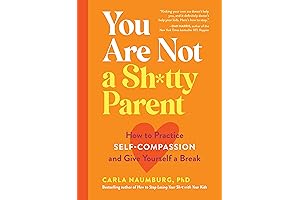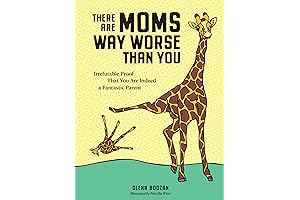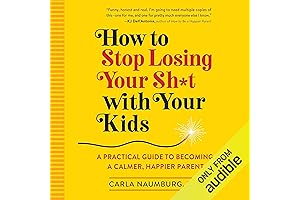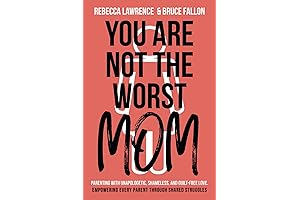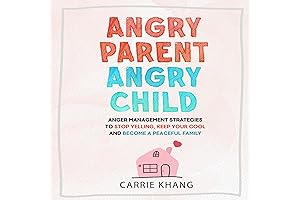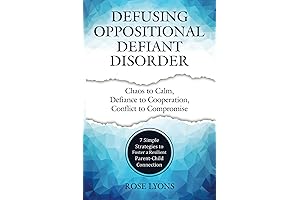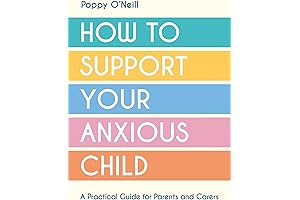· parenting · 10 min read
How to be the Best Parent You Can Be: The Ultimate Guide
Learn how to practice self-compassion, give yourself a break, and become a calmer, happier parent with these helpful tips.
Being a parent is hard. There are endless challenges, and some days, it can feel like impossible to do anything right. But it's essential to remember that you are not alone. Other parents have been through the same thing, and many resources are available to help you. This guide will provide you with everything about you need to know about parenting, from self-compassion to anger management. With these tips and tricks under your belt, you can be the best parent you can be.
Overview

PROS
- Empowering parents to practice self-compassion and let go of guilt.
- Provides practical strategies to rediscover joy and fulfillment in parenting.
CONS
- May not resonate with all parenting styles.
- Some concepts might require additional context or examples.
Prepare to shed the weight of parental guilt and embrace the transformative power of self-compassion with 'You Are Not a Sh*tty Parent.' This insightful guide recognizes the challenges of parenting and offers a much-needed lifeline for overwhelmed parents. Through its relatable anecdotes and evidence-based strategies, it empowers you to break free from unrealistic expectations and cultivate a healthier parent-child dynamic.
The journey to self-compassion requires intentional practice, and this book provides a roadmap to guide you every step of the way. It teaches you to reframe negative self-talk, challenge perfectionism, and set boundaries that prioritize your well-being. By incorporating its principles into your parenting approach, you'll not only become a more resilient and fulfilled parent but also foster a stronger connection with your children. 'You Are Not a Sh*tty Parent' is an indispensable resource for any parent seeking to overcome self-criticism and embrace the joy of parenting.

PROS
- Reassuring and humorous tone that alleviates parental guilt and anxiety.
- Provides practical advice and encouragement, empowering parents to navigate challenges.
CONS
- Some readers may find the colloquial language and humor a bit too casual.
- Focuses primarily on the positive aspects of parenting, which could be limiting for parents facing significant difficulties.
In a world where parenting is often idealized, 'You Are Not a Shitty Parent' comes as a refreshing antidote to the pressure and guilt that many parents feel. Through relatable anecdotes and scientific research, this book offers a much-needed reminder that perfection is not a prerequisite for being a good parent.
With its witty and down-to-earth style, the book delves into the common struggles, fears, and triumphs of parenthood. It challenges societal expectations and encourages parents to embrace their own unique journeys. While it doesn't shy away from addressing the challenges, the book ultimately delivers a resounding message of reassurance and encouragement, reminding parents that they are doing a fantastic job, even if they don't always feel like it.

PROS
- Provides practical strategies for managing stress and anger as a parent.
- Offers a compassionate and understanding approach to parenting challenges.
- Empowers parents with tools to create a more harmonious home environment.
- Promotes self-care and emotional well-being for parents.
CONS
- May not resonate with all parenting styles.
- Some concepts may require additional support or resources to implement effectively.
As a parent, it's easy to feel overwhelmed and frustrated at times. 'How to Stop Losing Your Sh*t with Your Kids' offers a refreshing and practical approach to managing these challenges. Drawing on the latest research and real-life experiences, this guide provides a step-by-step roadmap for creating a calmer, happier home environment.
What sets this book apart is its compassionate and understanding tone. The author recognizes that every parent has their own unique struggles, and avoids judgment or blame. Instead, the focus is on empowering parents with tools and techniques to effectively manage stress and anger. The strategies outlined are easy to implement and can make a significant difference in daily interactions with children.

PROS
- Empowers parents through shared experiences and relatable struggles.
- Promotes self-acceptance and reduces parenting stress by fostering a supportive community
CONS
- Some may find the approach too candid or controversial.
- May not resonate with parents seeking a traditional parenting guide.
'You Are Not the Worst Mom!' is a refreshing and empowering parenting book that challenges conventional wisdom and encourages parents to embrace their imperfections. The author draws on her own experiences as a parent to create a relatable and authentic guide that tackles common parenting struggles and anxieties. By sharing her own journey, the author creates a sense of community and shared experience, assuring parents that they are not alone in their challenges.
The strength of this book lies in its honest and unapologetic approach. The author normalizes the ups and downs of parenting and encourages parents to embrace the chaos. The book emphasizes the importance of prioritizing self-care and setting boundaries, sending a powerful message to parents that it is okay to focus on their own needs. Through relatable anecdotes and practical advice, this book is a valuable resource for any parent seeking to navigate the challenges of parenthood with self-compassion and a touch of humor.

PROS
- Provides effective anger management techniques tailored specifically for parents
- Empowers parents to break the cycle of yelling and create a more harmonious family environment
CONS
- Some strategies may require professional guidance for optimal results
- May not be suitable for all parenting styles
As a parent, it's easy to get caught up in the daily grind and lose sight of our emotional well-being. The constant demands and challenges of raising children can push even the most patient of us to our limits. If you find yourself yelling at your kids more often than you'd like, 'You Are Not a Shitty Parent' is here to offer a lifeline.
This book is a comprehensive guide to anger management for parents, packed with practical strategies and real-life examples. It will help you understand the triggers that lead to angry outbursts, develop coping mechanisms, and create a more peaceful home environment for yourself and your family. Remember, you're not a shitty parent; you're just a human being trying to navigate the complexities of parenting. With the right tools and support, you can break the cycle of anger and build a stronger, more loving relationship with your children.

PROS
- Recognizes the struggles of parents facing Oppositional Defiant Disorder (ODD) in children.
- Provides clear and actionable strategies for fostering a harmonious parent-child connection.
CONS
- May not be suitable for parents seeking in-depth clinical advice or therapeutic interventions.
- Some readers may find the title's language to be confrontational.
You Are Not A Sh*tty Parent: Defusing Oppositional Defiant Disorder is a valuable resource for parents navigating the challenges of ODD. Its strength lies in its practical and empathetic approach, offering tangible strategies to empower parents and enhance parent-child relationships.
Author Kevin Ryan, a respected psychologist, draws on years of experience to present seven simple yet effective strategies that can help parents defuse oppositional behaviors, promote cooperation, and foster a resilient family bond. By incorporating mindful parenting techniques and emphasizing connection rather than punishment, the book empowers parents to respond to their children's challenges with compassion and effectiveness.

PROS
- Meticulously researched and evidence-based, arming you with expert insights.
- Practical and relatable content, designed to resonate with parents and caregivers directly.
CONS
- While the book delves deeply into childhood anxiety, it may not fully address the nuances of all anxiety disorders.
In a world where anxiety disorders are prevalent, parents and caregivers often feel overwhelmed and uncertain. Recognizing this pressing need, 'How to Support Your Anxious Child' emerges as a beacon of guidance. This practical guide, meticulously crafted by experts, empowers you with evidence-based strategies to navigate the complexities of your child's anxiety. Expert insights seamlessly blend with relatable anecdotes, offering profound understanding and actionable solutions. As you delve into its pages, you'll discover a comprehensive roadmap for creating a supportive and empowering environment for your child. Embark on this journey with 'How to Support Your Anxious Child' and witness the transformative power of informed parenting.
This book transcends mere knowledge dissemination; it's a testament to the authors' deep empathy for both anxious children and their caregivers. Through personal anecdotes and real-life examples, the authors establish an intimate connection with readers, fostering a sense of community and shared understanding. Each chapter unfolds as a blend of compassion and expertise, empowering you as a parent or caregiver to embrace your pivotal role in nurturing your child's emotional well-being. Whether you're seeking guidance on communication strategies, behavior management techniques, or self-care for caregivers, this guide offers a wealth of practical tools and insights. Remember, you are not a 'shtty parent'; you're simply a parent who's eager to understand and support your child. Let 'How to Support Your Anxious Child' illuminate your path, empowering you with the knowledge and confidence to foster a thriving and resilient child.
This guide provides practical advice on becoming a better parent. It discusses how to practice self-compassion for parenting. Anger management strategies to stop yelling in parenting. How to communicate effectively with your children. Discipline techniques that work. How to build a strong parent-child relationship. The guide is a valuable resource for new parents to experienced parents.
Frequently Asked Questions
What is the first step to becoming a better parent?
The first step to becoming a better parent is to practice self-compassion. This means being kind and understanding towards yourself, even when you make mistakes. It also means giving yourself a break when things are tough and not expecting yourself to be perfect.
How can I manage my anger as a parent?
Here are some anger management strategies for parents: * Take a timeout when you feel yourself getting angry. * Practice deep breathing exercises. * Talk to someone about your anger. * Find healthy ways to express your anger, such as exercise or writing.
How can I communicate effectively with my children?
Some tips on effectively communicating with your children:* Talk to your children respectfully.
How can I build a strong parent-child relationship?
Here are some tips for building a strong parent-child relationship:* Spend quality time with your children.* Be involved in your children's lives.
